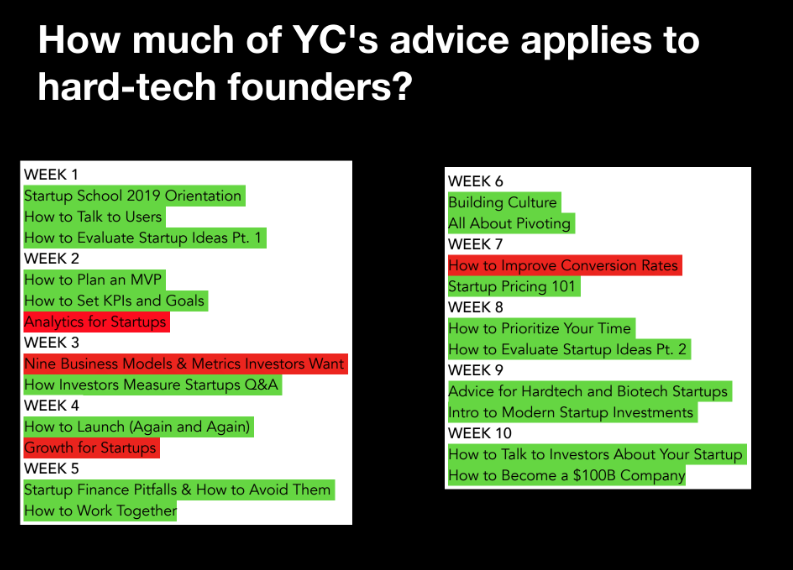Building Difficult Technology
07 Nov 2019When thinking about what I want to work on, I am most inspired by deep tech/hard tech/high tech/whatever-you-call-it tech. I love the ambition of it.
I would be happy if more people and companies working on those inspiring challenges. And I want to help them. But how? How can we do that?
The advice from Paul Graham in how to have startup ideas is to get to the edge of a technology (either as a user or creator) and build what is missing. Does this advice apply to hard problems or only product market fit type problems?
According to Jered Friedman most of Y Combinator advice still applies to hard tech companies and Sam Altman says the same. (Sorry it’s always Y Combinator sources, but they have great resourses).
 They claim starting a hard tech company is easier than a “normal company” AND that most of the advice out there is still useful to you. Good news eh? slides
They claim starting a hard tech company is easier than a “normal company” AND that most of the advice out there is still useful to you. Good news eh? slides
So there’s resources with blueprints for how we can get going. But still, don’t you need to be special to work on these types of problems? Like, really special .
I can imagine that if I go home at Christmas and say that I’d like to develop a cheaper drilling method for geothermal energy wells, I would get some strange looks. If I said I’m aiming for wells that are kilometers deep I would feel that I am saying something ridiculous. Something impossible.
But there are examples of people that just started working on something huge without any extraordinary genius advantage. John Crowley built a biotech company for his daughters. Blake Scholl (a software engineer) started a supersonic aeroplane company because he liked planes.
His company Boom isn’t yet a home run winner, but that’s not the point. The point is that they are trying something extremely ambitious and that they aren’t aliens, just American. Snippets from an interview with Blake Scholl show it:
TC: Blake, you [spent a handful of years with Amazon, working on mobile shopping, then Groupon acquired a mobile payment company you’d co-founded, Kima Labs, and you stayed on]. So you’re at Groupon. You don’t have an aerospace background. But you decide that you are the guy to start a supersonic jet company. How did that happen?
BS: It goes back to the decision I made to sell [Kima Labs] . . . I thought, is it worth what I will go through personally for the product we’re building, or should I take the great offer and live to found another day? And so I took the offer, and in reflecting on that, what I realized is, like, all startups are hard. There’s no such thing as an easy startup…
My personal passion for a long time had been airplanes… And so I thought, I have to look at the supersonic thing that I’ve been sort of thinking about for a decade, and do some research, and probably get it out of my system.
The first thing was to understand why it hadn’t been done already…
[So I went back to] first principles and [thought], the Concorde was created 50 years ago with slide rules and wind tunnels. And half a century later, [I wondered] why is that not working, and what would it take, and the answer was that the fuel economy was the problem. It was too expensive to operate, [so] none of the people could afford to fly on it. And you start to run the numbers and say, well — by the way, all this stuff you can do out of Wikipedia — what would you have to do to make this economically feasible? It turns out the answer is [to make the fuel efficiency] 30% [better] versus what was designed a long time ago. And you start to realize, that doesn’t sound impossible. [So] I went off and read some aerospace textbooks, and took a design class, and started to meet everybody I could find in the industry, and I told them to shoot holes in my idea. And eventually, people started saying, ‘No, this actually makes sense.’ And so we started the company.
When I talk to English friends about languages they often say things like “I wish I’d tried to learn when I was young, it would’ve been so easy… it’s too late now”. But that’s self-delusion. That’s putting work on a version of yourself that isn’t you.
It’s not too late. You didn’t have to start when you were six, you have to start now and keep trying and for 6 months you need to sound stupid when you talk.
I feel that same cop-out thinking when I’m considering hard technology problems. I’m not a genius. I didn’t build a bomb when I was 12. I was playing fifa at age 15, not hacking into government databases. I feel ridiculous at the thought of trying anything outlandish.
I hope that is wrong. If everything remarkable had to be done by a genius, surely we wouldn’t be as far as we are now? Surely the lucky ones of us who can just need to dare?
I think some advice I once got from someone who isn’t in Y Combinator may be useful. During my masters I was studying gaussian processes on the train and understanding none of it, the guy opposite me got up to leave, and as he was going he said
“If it was easy, we’d all be doing it. Stick at it.”
Stick at it.